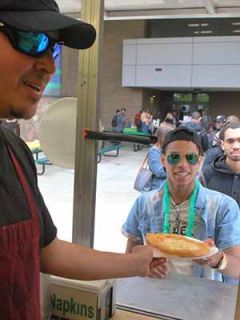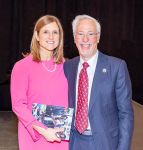News and Releases
Making Textbooks Affordable
Share
savedforweb-28c07b49.jpeg)
NVCC Hosts Open Educational Resources Conference
Skyrocketing tuitions and student loan debt can make affording college a challenge for many, and a dream that’s out of reach for some. It’s no surprise that when you add the cost of textbooks to the equation, the financial strain on students and their families increases. With higher education costs continuing on their current trajectory, many schools, students, faculty, and administrations are tapping into a framework known as Open Educational Resources (OER). OERs are freely accessible, openly-licensed text, media, and other digital assets that are useful for teaching, learning, and assessing, as well as for research purposes. The OER framework has many objectives, but a main one is to lessen the financial burden facing many college students. With planning assistance by the CSCU Council of Library Directors and the Connecticut Distance Learning Consortium, NVCC hosted a half-day conference for students focusing on OER advocacy on Friday, March 11 in the Founders Hall Community Room. The conference began with an opening session led by Nicole Allen, Director of Open Education at SPARC, a global coalition committed to making open the default for research and education. Allen discussed how OERs are eliminating the cost of textbooks while improving student success outcomes and empowering faculty to regain control over their instructional materials. She also addressed how students can speak up to support this effort.
The conference continued with a session on current CSCU-system efforts that support OER adoption and segued into a student panel detailing what various CSCU SGA groups across the state are doing to raise awareness on their local campuses. Kaitlyn Vitez, Public Interest Research Groups (PIRG’s) higher education advocate, reviewed some key principles for running a successful campaign, from working with campus leadership to recruiting peers to help lower the cost of textbooks.
Jaime Hammond, Director of NVCC’s Max R. Traurig Library, serves on a system-wide OER subcommittee. “When faculty choose to use OER for their course, not only are they exercising their academic freedom, but they are removing a sizable financial barrier for students. By avoiding costly commercial textbooks, students are able to invest those dollars into more courses each semester. The CSCU Council of Library Directors and CTDLC are committed to supporting this effort through advocacy and assistance to faculty who are interested in using an OER. It was a great day of collaboration and brainstorming, and we’re looking forward to this becoming an annual event,” she said.
Other Naugatuck Valley Community College News
HAVE A QUESTION? EMAIL US.
Reporters and media inquiries, please contact us at










